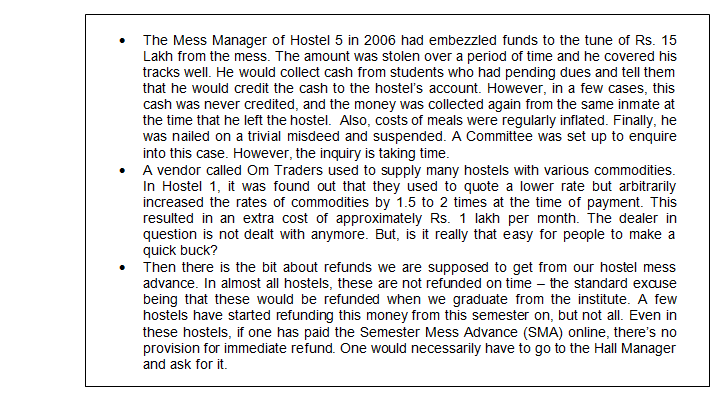Mess Embezzlement
Tarun, Gautam, Mohit, Rushil and Manas expose the ugly underbelly of the institution of hostel messes
At the outset, it is imperative to mention that we started out this entire exercise by investigating different types of embezzlement on campus. However, after considerable research, we still couldn’t find compelling evidence to support claims of embezzlement as far as construction and environmental issues went. We are, however, capable of building a case for the existence of embezzlement in messes. Even here, we were asked to maintain the anonymity of most of our sources.
Let us start by exploring some mess issues. First, when students sign invoices brought to them, they rarely check the quality or quantity of the goods brought. It is very easy for a vendor to slip in a few kilos of rotten goods or to even bring in a few kilos less. Realistically, it would be too much to ask a Mess Co. to verify each and every item coming in, and this is where things start going wrong. They become mere thumb-impressionists and their purpose as vigilantes is defeated. Second, the standard procedure for expensive purchases is that three different quotations are asked for and then the cheapest is picked. If one wishes to go for a more expensive option, one must also provide sufficient justification. Vendors often go under several different names and end up supplying all three quotations themselves. Also, blacklisting a vendor doesn't help; he simply resurfaces with a different name.
Third, there have been cases where some Mess Cos. have been found to be in cahoots with the managers, and have fraudulently used funds from their own hostels. Fourth, mess workers have two shifts a day. It’s common for them to slip out during their shifts with items pilfered from the mess – sometimes even LPG cylinders. It is, in fact, legal for them to take home cooked food. Expensive items like sweets and non-vegetarian food are sometimes unnecessarily cooked in excess to abuse this right. Further, mess workers have been known to waste large amounts of food out of plain spite; emptying 15 kilos of oil down the drain, for example.
There have been cases of dealing with issues sternly, though. Our Dean, SA himself recalls that during his stay in IIT, hordes of students from a particular hostel would personally negotiate with vegetable wholesalers. More recently, though, when their mess bills came out to be around Rs. 1,800 per month, students of Hostel 1 got involved in these messy matters. They conducted regular quality and inventory checks, enforced competition between dozens of vendors to their own benefit and managed to reduce the daily mess bill from Rs. 55 to Rs. 32.
What these facts highlight is the urgent need for greater vigilance. As majority members of the community, we can play an important role in maintaining pressure on the ‘people at work’ and ensuring optimal utilization of resources. After all, it’s our money that’s being embezzled.

